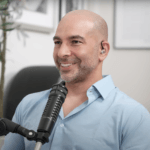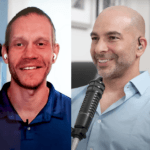Five years ago today, The Drive podcast officially hit the gas. What started as a slow formation lap to gauge public interest has grown into a full-speed endeavor, and I continue to be astounded and honored by the support and enthusiasm that so many of you have shown for our work.
It’s a race which we hope is far from over, but before heading into the next lap, I took a quick pitstop with my team to reflect on the last five years, muse on a few “what ifs,” and finally, set our sights on the road ahead. Below are some questions I’m frequently asked by listeners and friends, alike.
The Rearview Mirror
What have been the most and least enjoyable aspects of working on The Drive?
Learning has definitely been the best part of the podcast. Both in preparing for each episode and in chatting with so many brilliant guests, I’ve been exposed to ideas and topics in biomedical science that I’ve never heard before and have deepened my understanding of those I had been familiar with already. I’ve easily learned as much from this podcast as any of our listeners have.
The least enjoyable part has been on the promotional side – thinking about search engine optimization, maximizing social media visibility, and so forth.
What are five scientific/medical ideas you’ve changed your mind about or five of the most surprising things you’ve learned from the podcast?
- Heat is probably beneficial to lifespan. The evidence that sauna use has benefits for sleep, cognition, cardiovascular disease, and other aspects is constantly growing.
- Though I once leaned toward the “Carbohydrate-Insulin Model” for weight gain/loss, I’ve come to believe that the “Energy Balance Model” provides a better explanation that more closely aligns with empirical evidence, especially in light of data from GLP-1 receptor agonist drugs.
- Blood flow restriction is more than just a painful way to train. It is also very likely to be quite beneficial, enhancing gains in muscle mass and strength for a given load and number of reps.
- VO2max is more important than I previously appreciated. It is more strongly associated with reduced mortality risk than any other metric we know of, and this is likely because it’s the best integral function we have for exercise volume and intensity.
- Number of reps doesn’t matter as much as I had previously thought, provided you normalize for reps in reserve. As explained recently by Andy Galpin, getting close to failure from a relatively low number of reps can lead to equal or greater strength gains than getting to the same point from a much higher number of reps.
The Roads Not Taken
Which 5 people do you wish you could interview on the podcast (dead or alive)?
The list is so much longer than five, and if we’re really going all-out, it’s all dead people, but I’ll limit myself to people who have died “recently” to keep the list from getting out of hand:
- Ayrton Senna (I know, big surprise)
- David Foster Wallace
- Richard Feynman
- Lyndon B. Johnson and Richard Nixon together
- Rosalind Franklin
And as long as we’re fantasizing anyway, I’ll give myself a bonus sixth choice: Neil Armstrong.
In an alternate version of history in which you don’t return to practicing medicine and The Drive never happens, what do you do professionally?
It’s hard to say, but if I had to guess, I think my background would have pulled me in the direction of biotechnology venture capital, though something in credit markets might have been another possibility.
The Next Lap
Do you think you’ll still be doing this podcast in another 5 years from now?
It’s very likely. The list of subjects I want to dive deeper into is growing rather than shrinking, a trend that is somewhat self-perpetuating since more knowledge leads to more questions, and new research is constantly changing the game. Essentially, my appetite for knowledge is increasing faster than I can satiate it.
The Race Continues
So today marks the completion of “The Drive for Five,” but that’s just one mile marker on what I hope will be a much longer ride. We can hardly wait to start the next lap tomorrow.
For a list of all previous weekly emails, click here.




